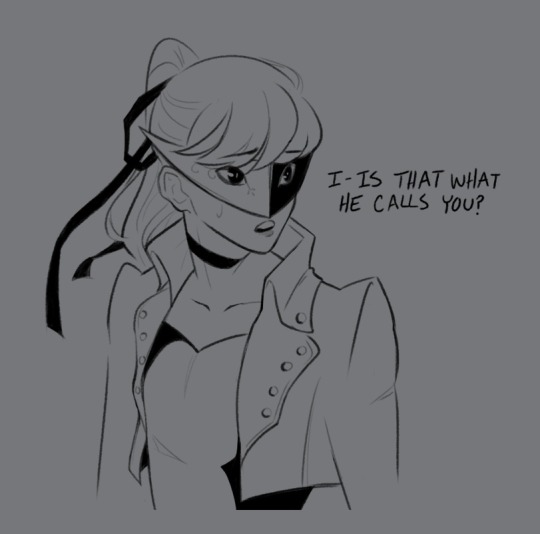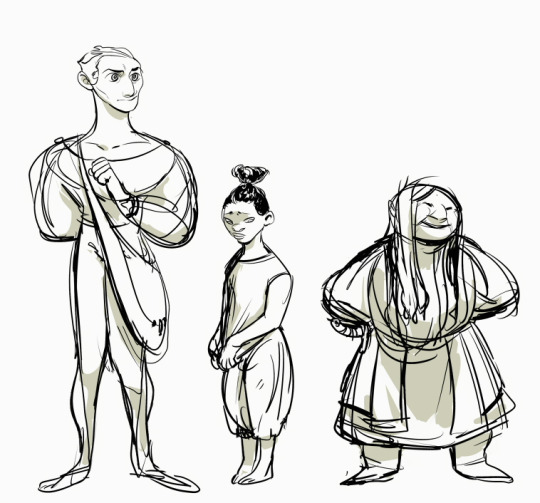#also give joker piercings you cowards
Text




Based on this textpost I saw like yesterday:

#Ren is SO into pet names I can feel it#also give joker piercings you cowards#persona 5 royal#p5r#persona 5#sumire yoshizawa#joker persona 5#ren amamiya#akira kurusu#goro akechi#shuake#akeshu#fan art#my art#this was a fun warm up for a project#I should draw silly stuff more often this was fun
3K notes
·
View notes
Text

This is a commission I did for @hoskky! She drew these characters, gave me a vague description, and asked me to flesh them, so here are three little backstories I wrote for each. Set in a vaguely-fictional medieval Persia.
Commission Info
The Runner
Rahim first realized he was fast when he was seven years old. He had always known he liked running, of course, but that was typical of a young boy. The epiphany came when he was seven and he found himself challenged to a dare: retrieve a pomegranate from the tree at the far side of the school master’s garden, and get back to the street without getting caught. Though he feared the beating that would surely be in store if he failed, Rahim could not tolerate his friends thinking him a coward. Overcome by pride and the need to prove himself, he clambered over the wall and crept through the bushes.
It had been his intention to achieve his goal through stealth, and he managed to get all the way to the tree and pluck a pomegranate from its branches without being seen. He had just turned back to the wall to wave to his friends poking their heads over when heart-stopping bark reminded the hair on the back of his neck that humans were prey animals. The saluki dog raced down the garden path toward him, graceful legs galloping like a horse and silky hair streaming from its ears and tail. Rahim only needed a moment’s glance at the snarling teeth to take off in a sprint. Rahim pushed his legs faster than he ever had in his life, certain that the dog’s breath so close behind him was pushing him onward. When he reached the edge of the garden, he tossed the pomegranate over the wall and leapt up a trestle of ivy. At the top of the wall, he perched with one leg hanging on both sides. He looked to his left and saw a dog furious that he’d outrun it, and then looked to his right and saw his schoolmates shouting and cheering. From that moment, he knew two things: one, speed was a gift he possessed in strides, and two, he rather liked being above everyone else.
Over the years, his parents were pleased with him. Rahim was a dutiful son, paid attention to his studies, respected his elders… and won every race he entered. He was the best, but that didn’t necessarily mean he was the kindest. An endless stream of praise from relatives and teachers alike can do things to a man’s ego, so when he sprinted past the finish line at the spring athletics competition, he felt confident that he deserved the applause being thrown his way. When an attendant from the palace introduced himself afterwards, praised his speed and stamina, and offered him a position running messages for the Shah, he felt he deserved that, too.
Rahim left his small town to travel to Asheveh. There, he became a royal messenger and raced around the empire. He enjoyed the luxurious perks that came with palatial connections while he was at home, and also relished every mission he was sent on. Nothing made him happier than running down long roads, letting the warm air fuel his lungs and his legs flow so rhythmically that it would take more effort to stop. Some people said that racing was his one true love, and that was why he’d never pursued any romantic relationships. He wasn’t sure if that was true; he’d just never found the time nor inclination. On any sunny day, he could often be found running back home after a job, an invisible saluki nipping at his heels. Back home was fine wine, decadent food, and an evening of good company with other well-respected workers in the palace, but in the moment, there was only the race.
The Urchin
Tamaris had never been comfortable with her older brother’s stealing. She knew where he got the loaves of bread he sometimes brought home, but she tried not to think about it. It became even worse the first time her older brother had shown her how he picked pockets, and then she was met by crushing terror when he told her it was her turn. She pressed her back against the sandstone wall, shaking her head. She would get caught! And stealing was wrong! But her brother scolded her, pointed out that picking pockets was what had put food on the family table for years, and that, being six, she was old enough now to help support the family. With the guilt piled on, she hesitantly crept into the bustling market.
Shafts of light pierced through gaps under the brightly coloured awnings and voices cried out from every stall. The smell of sweaty bodies and spices on display nearly overwhelmed her, and she felt certain that every vendor and shopper alike was watching her and knew what she was planning. The panic nearly sent her scurrying back to her brother to insist she couldn’t do it, but the thought of him scolding her and thinking she was a baby was even worse. She tried to find someone who looked wealthy - someone whose day wouldn’t be ruined by losing a few coins. She spotted a man arguing over the price of a necklace and eased toward him, slinking past a donkey and creeping up behind him. She swallowed heavily, licked her chapped lips, and reached for his pocket. Just like her brother had demonstrated, she pulled out the pouch of money and then bolted into the crowd. She didn’t even look back to see if he’d noticed.
Tamaris didn’t stop running until she reached a sunny plaza and fell into the shade of a date tree. Breathing hard, she looked down at the money pouch in her shaking hand. She tipped the coins into her palm, dazzled by the gleam, and then quickly put them away before someone saw and asked where she’d gotten them. A scrawny girl in clothes as baggy as hers clearly hadn’t come by them honestly.
With that thought, guilt spread through her like venom from a snake bite. She was a thief. A dishonest, thieving, no-good street urchin. When she was little, she’d hated the disgusted looks richer people gave her when they passed her on the street, but she deserved them now, didn’t she? People looked down on kids like her because you couldn’t trust them, and they were right. She tried to tell herself that this money would help feed their widowed mother and younger siblings, and that they needed it more than the rich man needed the necklace, but she still felt awful.
She turned her head away from the market and toward the domes and slender pillars of Asheveh’s palace in the distance. Tamaris tried to imagine how nice it would be to live there and spend her days lounging on silk cushions as servants fanned her and brought her infinite platters of food. It was hard to imagine such luxury being real when she’d spent her whole life in the slums. She had good friends there, and the camaraderie between those that had nothing was unmatched, but she often dreamed of a world of sparkling fountains and golden jewellery. She wanted that life so bad she could feel the longing lashing against her rib cage, but this pile of stolen coins clutched in her hand was the closest she would ever get to it. She’d never achieve wealth without stealing it, and she’d never be anything but a thieving street rat.
The Warrior
It was the final months of the Isfahan Campaign. The war had raged for almost two years now, and the enemy was on their last legs. What were they fighting for? Well, Behrou had never bothered thinking too hard about that. She was a soldier, and soldiers went into battle when told. The whys and the whens were questions for the officers to sort out.
That morning, the sun rose over the hill and shone like gold on the cavalry’s spears. With the blast of a horn, a hundred horses galloped down the slope to the enemy encampment below. Wind whipped the flags, voices shouted in unison, and the ambushed enemy scrambled to pull their pants up in time to meet them. Behrou rode at the front of her division and led them into the encampment. They cut down every last one of those barbarous curs before the sun was halfway up the sky, giving them time to be back to their own camp before lunch.
But then, just as they were settling down to enjoy a well-earned meal, Behrou spotted movement behind a fig tree. Sneaking up behind the lieutenant was a straggler from the enemy camp, dripping with blood and face filled with vengeful fury. The lieutenant, too busy feeling pleased with himself after the successful raid - as officers are wont to do - didn’t even notice. The enemy began to raise his scimitar to strike down the unsuspecting lieutenant, but before he could deal the fatal blow, Behrou threw her spear like a javelin. Her aim was true; the spear went right through the enemy’s neck and sank into the trunk of the tree, pinning him there. Everyone in the area stopped to stare, and in the utter silence that followed, a single fig dropped from the tree and plopped onto the dead man’s head. Behrou stepped past the frozen lieutenant to pick up the fig. She held it out to him and said, “Care for some dessert, sir?”
At the conclusion of this tale, the bar erupted into applause. Behrou, withered by age, drank in her audience’s rapt attention… and then drank in another mug of beer. Was it true, she was asked, the part with the fig? Behrou assured him that of course it was true, and that for the rest of the campaign, some jokers in her regiment thought it would hilarious to offer her a fig at any opportunity. From there, she moved on to the next story, a tale that involved a daring mission across enemy lines and how she and a small handful of companions scouted out the enemy’s numbers. She remembered the mission fondly, and especially remembered how it felt to ride a horse with joints that didn’t creak, to sleep in a tent on the ground without aching the next day, or to spring to action at a word and never look back. She was old now, and the vigour of youth was long behind her. Things had been simpler in her youth. She went where the officers told her and fought the enemy because they were the enemy. Your friends were the ones who fought at your back and you never worried more than a month ahead, because who knew if you’d still be alive to deal with it?
At a young age, Behrou had realized that her parents’ farm held nothing for her but a future of marrying a farmer, so she followed the trumpets into the cavalry as soon as she was old enough to do so. She rose through the ranks until she commanded scores of soldiers (but never to officer, of course - she would be insulted to be mistaken for an officer), and every time she screamed a battle charge while stampeding into battle, she thought about how the rows of pikes ahead of her were still a better future to look forward to than season after season of wheat fields. And eventually, after decades of adventure, the borders of the empire began to stabilize, campaigns came fewer and far between, and her treacherous body started having trouble getting on and off a horse. In the end, she retired with honour, a handful of medals, and enough stories to fill a book.
It had been a good life. She took her military pension and bought a house in Asheveh, because even now she wanted to stay as far away from a farm as possible. She’d been all across the empire with the army and seen more of it than most of the patrons in this bar combined. She had a thousand and one tales of daring and valour, and a few more that focused on the naughty bits. As long as her stories kept flowing, so did the beer.
4 notes
·
View notes